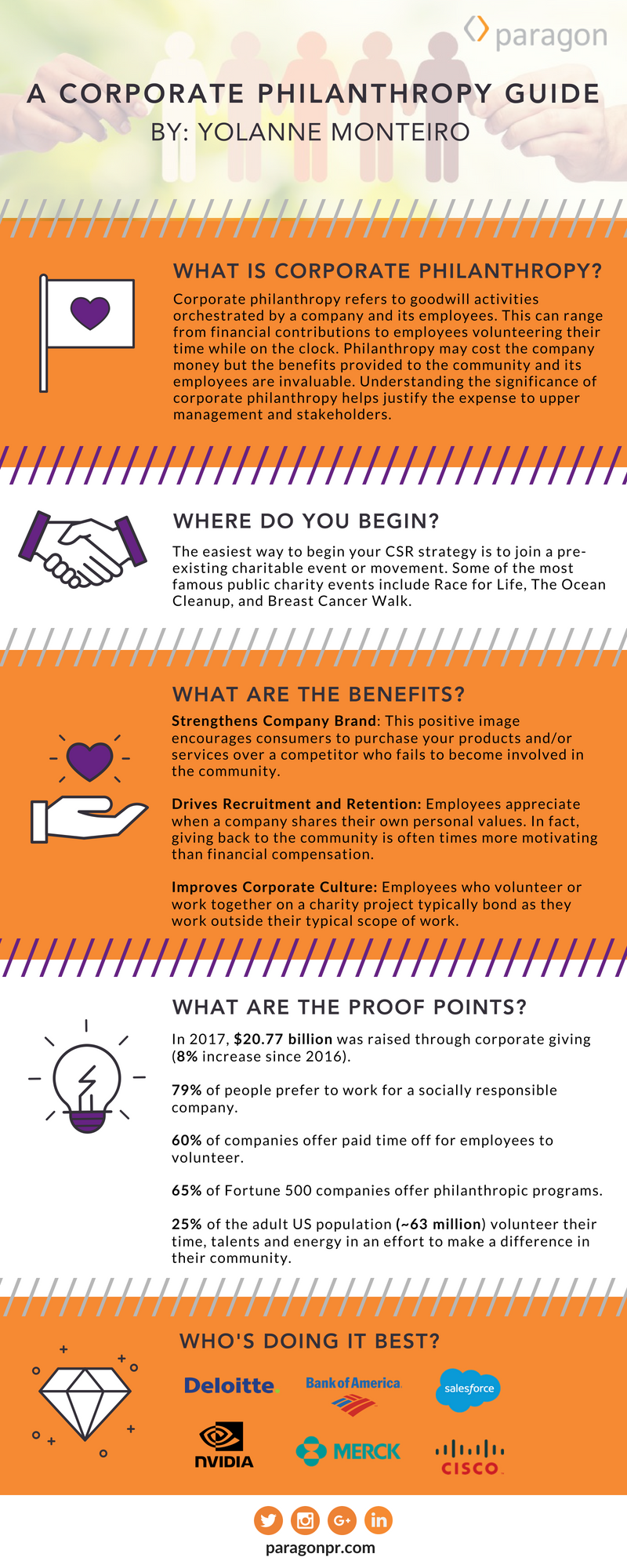Corporate philanthropy in action: real-world case studies that inspire
Exploring Just How Company Philanthropy Shapes Brand Reputation and Consumer Commitment
Corporate philanthropy greatly affects brand name credibility and customer commitment. Companies that take part in genuine philanthropic initiatives often see a favorable shift in just how customers perceive them. This placement of worths fosters trust fund and emotional connections with target markets. The performance of these humanitarian efforts can differ considerably. Understanding what absolutely resonates with customers is vital for brands seeking to enhance their social effect and market position. What approaches will become crucial for future success?
The Development of Company Philanthropy
As companies increasingly identify their role in society, the advancement of corporate philanthropy has actually changed from mere philanthropic donations to a calculated part of brand identity. Business involved in philanthropy primarily for tax advantages or to improve their public picture. With time, this approach moved as stakeholders-- consisting of consumers, investors, and employees-- demanded a much more genuine dedication to social duty.
Organizations started straightening their kind initiatives with their core values and business goals, causing even more impactful and thoughtful payments. This adjustment has actually motivated business to purchase lasting techniques and area growth, cultivating a feeling of objective that reverberates with customers.
Technical improvements have actually helped with transparency and involvement, permitting services to showcase their kind initiatives much more efficiently. Business philanthropy has arised as an essential component of organization method, with organizations welcoming the opportunity to favorably influence culture while enhancing their total brand name narrative.
The Effect of Philanthropy on Brand Understanding
While companies take part in philanthropic initiatives to promote social excellent, these efforts substantially shape brand name perception amongst consumers. Company philanthropy can enhance a brand name's image by connecting it with favorable social impact and neighborhood participation. Consumers often view brand names that actively join charitable activities as even more trustworthy and responsible. This understanding can affect buying choices, as customers may like brand names that demonstrate a dedication to social issues.

Building Emotional Connections With Granting
Company philanthropy serves as a powerful device for boosting brand name identity by linking corporate values with neighborhood requirements. With critical providing, firms can foster community engagement and create shared values that resonate with consumers on an emotional level. This method not only enhances brand credibility however likewise develops long lasting connections in between organizations and their stakeholders.
Enhancing Brand Identification
They not just contribute to social excellent however likewise forge much deeper psychological connections with their audiences when companies involve in kind initiatives. By aligning their brand with philanthropic causes, firms boost their identification and signal values that resonate with customers. This positioning creates a story that surpasses services and items, welcoming customers to participate in a common objective. As consumers significantly focus on purpose-driven brands, companies that proactively engage in giving can separate themselves in a congested market. Such campaigns promote a feeling of loyalty amongst clients who really feel personally attached to the brand's worths. Inevitably, corporate philanthropy becomes a crucial device for enhancing brand identity, growing enduring relationships based upon common ideas and psychological interaction.
Fostering Neighborhood Engagement
Many researches indicate that firms engaging in community-focused philanthropic campaigns can substantially reinforce emotional links with their stakeholders. By spending in neighborhood projects and supporting social reasons, companies grow a feeling of belonging and trust within the neighborhood. This engagement fosters a favorable brand image, as clients appreciate business that demonstrate real problem for societal problems. Additionally, employees typically feel much more proud and determined to be related to a company that prioritizes neighborhood well-being. Therefore, customers are more probable to establish commitment in the direction of brands that proactively add to meaningful reasons. Ultimately, promoting neighborhood interaction with philanthropy not just enhances brand name track record however likewise builds lasting psychological ties that benefit both the neighborhood and the company it serves.
Developing Shared Worths
Exactly how can services properly develop shared worths that reverberate with their stakeholders? Companies can attain this by straightening their kind initiatives with their core mission and the interests of their areas. By participating in efforts that attend to local demands, companies foster emotional connections with customers, boosting brand loyalty. Partnering with non-profits that mirror shared values strengthens the brand's picture and shows commitment to social duty. Additionally, transparent communication concerning these efforts permits stakeholders to see the substantial impact of their contributions. Eventually, by incorporating common worths right into their corporate philanthropy, firms not just improve their reputations however also grow enduring partnerships with clients, causing raised loyalty and trust fund. This alignment is important in modern-day consumer decision-making.
Situation Researches: Successful Philanthropic Campaigns
Examining effective kind projects reveals different methods that boost brand name online reputation. Impactful community initiatives, cutting-edge partnership designs, and long-lasting interaction techniques have proven effective in fostering favorable connections with consumers. These situation studies highlight the significance of thoughtful company giving in attaining both social and service goals.
Impactful Area Initiatives
Numerous companies have successfully leveraged humanitarian projects to improve their brand name reputation while making a meaningful effect in their neighborhoods. For example, an innovation firm introduced a digital literacy program in underserved neighborhoods, supplying training and resources that equipped regional homeowners. This campaign not just contributed to neighborhood advancement but also placed the business as a socially liable leader. Likewise, a significant food firm executed an appetite alleviation campaign, partnering with local nonprofits to distribute dishes to households in demand. This effort enhanced neighborhood ties and cultivated consumer loyalty. Through these impactful efforts, firms have shown their commitment to social duty, efficiently straightening their brand worths with the demands of the areas they offer, eventually improving their overall track record.
Innovative Collaboration Designs
The success of impactful area initiatives usually pivots on cutting-edge partnership models that unite diverse stakeholders to deal with complex social difficulties. Instance researches illustrate just how corporations, non-profits, and government entities can team up successfully. As an example, an international corporation partnered with a neighborhood charitable to introduce an education and learning program, merging sources and experience to boost neighborhood literacy prices. Another example involved a technology business and a medical care organization joining pressures to develop a telemedicine solution for underserved populaces. These partnerships not just enhanced the reach of humanitarian efforts yet additionally strengthened the brands' online reputations by aligning their missions with community needs. Ultimately, cutting-edge partnership models act as a stimulant for purposeful change and foster stronger links in between brands and their customers.
Long-term Interaction Approaches

Measuring the ROI of Company Social Duty
As firms increasingly spend in business social responsibility (CSR) initiatives, comprehending the return on investment (ROI) connected with these efforts comes to be essential. Measuring ROI in CSR is multifaceted, commonly incorporating both measurable and qualitative metrics. Monetary returns can be examined through enhanced sales, improved brand name commitment, and boosted staff member spirits, which can bring about higher performance. In addition, companies may examine cost savings connected to lasting techniques, such as decreased waste or power usage.
Qualitatively, the influence of CSR on brand name credibility can be examined via consumer understanding studies and social networks belief evaluation. Surveys can provide understandings into just how CSR activities influence client loyalty and count on. Benchmarking versus market standards can help companies assess their CSR performance - corporate philanthropy. Eventually, a detailed strategy to determining ROI makes it possible for companies to make enlightened decisions regarding future CSR financial investments, lining up strategies with both monetary performance and social influence
Customer Expectations and Corporate Duty
Progressively, customers anticipate companies to run with a solid sense of business obligation, checking out moral practices as a prerequisite for brand loyalty. This change in expectation mirrors an expanding recognition of environmental and social problems, leading customers to favor brands that line up with their worths. Consumers are much more inclined to sustain firms that involve in clear techniques, demonstrate sustainability, and contribute positively to their neighborhoods.
Moreover, social media enhances these assumptions, allowing consumers to share their opinions and experiences swiftly. Brand names that fall short to meet these moral standards risk useful reference backlash, while those that welcome corporate obligation usually delight in superior track record and client loyalty. As consumers require responsibility, firms must integrate company social obligation into their core techniques, focusing on moral behavior not equally as an advertising approach, however as a basic aspect of their operations. This positioning can eventually result in stronger brand affinity and continual success in open markets.
Future Patterns in Company Philanthropy and Brand Name Commitment
The landscape of company philanthropy is advancing, affected by the intense customer assumptions bordering business obligation. Business are increasingly integrating social impact right into their core organization approaches, not simply as a supplementary activity. Future trends indicate a change towards transparency, with brand names sharing detailed details about their philanthropic initiatives and their straight impacts on areas.
In addition, innovation is playing a crucial role, allowing real-time interaction in between consumers and brands. Social media site systems help with straight interaction, permitting customers to voice their assumptions and hold brands liable. In addition, more youthful generations, specifically Millennials and Gen Z, prioritize sustainability and ethical methods, driving businesses to take on more diligent approaches.
As company philanthropy ends up being identified with brand identity, business that authentically align their goals with societal needs are most likely to promote more powerful customer commitment. This convergence of values will ultimately shape the future of company track record and customer connections in a significantly diligent market.
Frequently Asked Inquiries
Exactly How Do Consumers Learn about a Business's Philanthropic Initiatives?
Consumers discover a company's kind initiatives via numerous networks, including social media, news release, community occasions, and word-of-mouth. These opportunities facilitate recognition, enabling individuals to involve with brand names that line up with their passions and worths.
What Role Does Staff Member Participation Play in Business Philanthropy?
Worker participation in business philanthropy boosts engagement, promotes a feeling of possession, and strengthens team communication - corporate philanthropy. This engagement typically enhances the effect of charitable efforts, leading to greater understanding and support for the firm's kind initiatives
Can Corporate Philanthropy Backfire on a Brand's Online reputation?
If viewed as insincere or opportunistic, company philanthropy can certainly backfire on a brand name's credibility. Adverse public understanding might occur, leading to reduced depend on and commitment amongst consumers who prioritize authenticity in company activities.
Are Smaller Firms as Effective in Philanthropy as Larger Corporations?
Smaller sized firms can be just as effective in philanthropy as larger corporations, frequently showing dexterity and authenticity. Their local efforts might resonate more deeply with communities, fostering genuine links in spite of limited resources compared to their larger counterparts.
Exactly How Can Business Select the Right Triggers to Support?
Business can select the ideal reasons by aligning their values with neighborhood needs, evaluating stakeholder rate of interests, and assessing prospective effect. This tactical method promotes authenticity, enhances engagement, and strengthens connections with clients and the more comprehensive area.
While business engage in philanthropic efforts to advertise social excellent, these efforts substantially form brand perception amongst consumers. As consumers increasingly focus on purpose-driven brands, companies that actively involve in providing can differentiate themselves in a crowded market. Several business have effectively leveraged philanthropic campaigns to enhance their brand name online reputation while making a significant impact in their areas. Significantly, consumers anticipate firms to operate with a strong feeling of company obligation, seeing moral methods as a prerequisite for brand name loyalty. As company philanthropy ends up being synonymous with brand name identity, firms that authentically align their missions with societal demands are likely to foster more powerful customer loyalty.